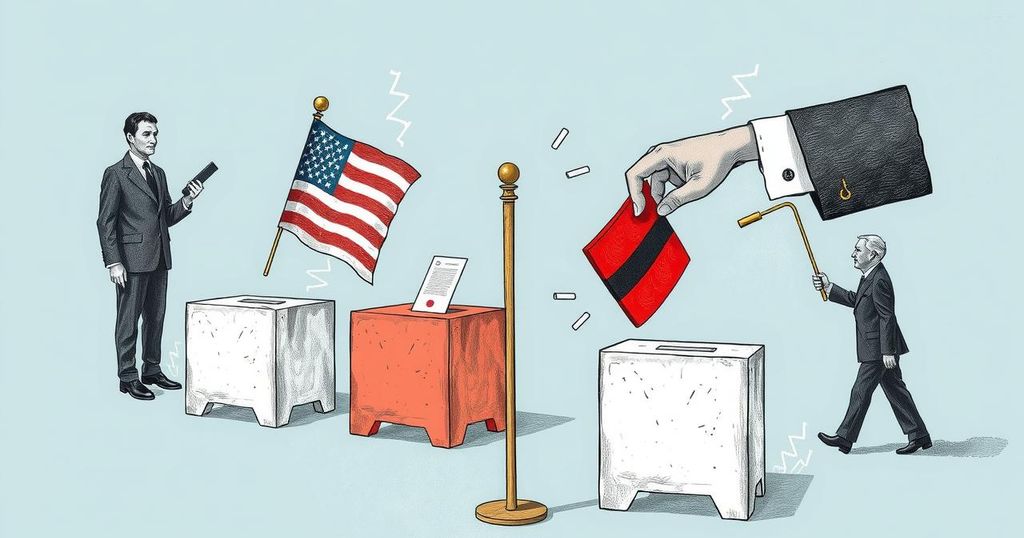Reflecting on 2024: A Call to Reassess Our Relationship with Elections
The commentary reflects on the disillusionment with the 2024 elections, which, despite being numerous, did not enhance democracy but often supported oppressive regimes and incited violence. There is a growing sentiment that focusing on elections distracts from building genuine democratic processes. Alternatives such as citizen assemblies and participatory governance are proposed to empower individuals beyond the ballot box.
As we enter a new year, while many may consider resolutions that revolve around personal habits, such as abstaining from alcohol, there is an urgent call to rethink our reliance on elections as mechanisms for improving democracy. The year 2024 was significant in electoral events, with 70 countries hosting elections that engaged over four billion individuals; nonetheless, rather than fostering democracy, these elections often served to fortify autocracies and exacerbate societal division. This disillusionment reveals a crucial misconception: elections do not inherently equate to democratic governance.
Despite grand expectations for positive change, the harsh reality of the 2024 elections highlighted what many have posited: our singular focus on electoral processes is detrimentally impacting democracy. Figures such as Josh Lerner from the global democracy hub People Powered articulated this sentiment, indicating that despite substantial financial investments into elections, the public remains skeptical of their efficacy in realizing genuine democracy—”most people don’t believe that elections are delivering actual democracy—government by and for the people—and they’re right.”
A troubling analysis by Freedom House detailed how many elections devolved into mechanisms of oppression; in 22 instances, incumbent leaders leveraged state power to jail or disqualify rivals, while in 16 elections, voters were faced with no significant choices due to manipulative practices. Violence played a significant role, impacting 26 monitored elections, with alarming incidents such as the targeting of candidates in Mexico and South Africa, as well as ethnic violence in India. Moreover, the concept of the ‘sore winner’ emerged, where victorious parties attempted to undermine any accountability or opposition, exemplifying a nuances of power dynamics that threaten democratic integrity.
While some analysts heralded the loss of incumbents as a sign of hope for democracy, these transitions often bred chaos instead of unity. Political conflict marked the aftermath of changes in leadership, such as South Korea’s attempted coup following their elections. Observers like Leonora Camner have noted the toxic nature of elections, suggesting that they promote division rather than empowerment, asserting that “Elections are fundamentally disempowering.”
Moving forward, it is imperative to redirect our efforts from casting votes to fostering democratic processes that champion collective governance. The lack of real shifts indicates a troubling entrenchment of powerful interests that manipulate the electoral landscape to their advantage. In the United States, for instance, partisan commitments appear to overshadow the necessity of genuine democratic reform, with conversations revolving around maintaining donor relations rather than substantial policy changes.
Propositions for empowerment within democracy can take multiple forms, including the establishment of citizen assemblies and participatory budgeting as indicated by Matt Leighninger. Such avenues encourage civic engagement beyond mere voting, revamping the local democratic infrastructure through enhanced community cohesiveness and constructive public discourse.
In conclusion, the events of 2024 serve as a stark reminder that elections alone are insufficient to guarantee democratic ideals. Instead, there is an urgent need for a paradigm shift that prioritizes active citizen engagement and reimagines governance, with the ultimate goal of fostering a more representative and democratic society where individuals feel their voices resonate.
The text discusses the interplay between elections and democracy in the context of the politically charged landscape of 2024, highlighting how the proliferation of elections across numerous countries did not lead to substantial democratic progress. Instead, the year underscored how electoral processes often became instruments of oppression rather than empowerment, reflecting a broader trend of disillusionment with traditional democratic structures. The commentary critiques the prevailing obsession with elections, advocating for alternative mechanisms that genuinely bolster democracy and civic engagement.
The analysis concludes that elections, as they currently exist, may be undermining democracy rather than supporting it. The call to action is to shift focus from mere electoral participation to real engagement in democratic processes, emphasizing community-driven governance that empowers citizens. As society grapples with the implications of the 2024 elections, it is essential to reconsider the approach to democracy, ensuring it is inherently participatory and representative of the people’s will.
Original Source: stocktonia.org




Post Comment